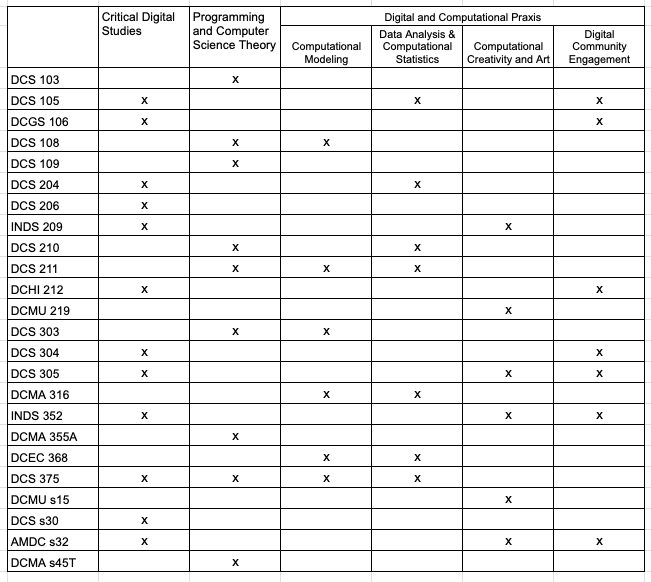Minor Supplemental Information
DCS Minor and other Majors/Minors/GECs at Bates
DCS does not restrict students completing this minor from completing other majors, minors, or GECs or from double-counting DCS courses for other majors, minors, or GECs. (Other academic units may opt for a restriction or a limit on double-counting.)
Thoughts on the wording “Digital and Computational Praxis”
We conceptualize praxis as the intersection of theory and application. Courses with these tags bring aspects of critical digital and computational theory to bear on different domain spaces. Though classes with these tags cover diverse fields and methodologies, they share the characteristic of theory informing action, and action informing theory.
Ability to Include Anti-Racism Requirement by Fall 2022
The Digital and Computational Studies program supports the goal that campus-wide offerings should address white supremacy and elevate anti-racist practices. While we currently offer courses that include a focus on power and privilege, we recognize that we are not subject-area experts in the study of race, anti-racism, decolonizing methodologies or white supremacy.
To address these gaps, we plan to work with experts in the Bates community and external consultants to implement forthcoming suggestions from the working group on curricular requirements focused on race, racism, power, and privilege. This work will necessarily involve examining our current course offerings, making changes to courses as needed, and consulting with experts as we introduce new courses. We intend for this work to follow the suggestions and work of experts both on and beyond campus, but also recognize the need for our academic unit to work internally as those broader initiatives move forward. Our plan is to undertake these curricular transformations over the next year. We hope to implement new requirements starting in fall 2022.
Table 1: Content areas satisfied by DCS courses
Learning Goals for Content Areas
The following learning goals are intended to help students and faculty
Programming and Computer Science Theory
Students taking classes tagged as Programming and Computer Science Theory can expect to:
- Investigate the logic, theory, power, and limitations of computation.
- Construct, critique, and analyze the efficiency of algorithms.
- Develop abstraction and design principles for solving problems from a variety of domains.
- Develop skills applying core computing concepts using modern programming tools.
Critical Digital Studies
Students taking classes tagged as Critical Digital Studies can expect to:
- Read and synthesize scholarship on the ways that structures of inequality manifest in and/or are reinforced by the digital and computational turn.
- Use theory to critique or contextualize digital and computational artifacts.
- Understand how digital technologies are shaped by the intentions and subjectivities of both creators and adopters.
- Interrogate the values and assumptions of a digitized world.
Digital and Computational Praxis
We conceptualize praxis as the intersection of theory and application. Courses in the tags below bring aspects of critical digital and computational theory to bear on different domain spaces. Though classes with these tags cover diverse fields and methodologies, they share the characteristic of theory informing action, and action informing theory.
Computational Modeling
Students taking classes tagged as Computational Modeling and Statistics can expect to learn how to:
- Learn theory of approaches from modeling or computational statistics by which it informs the way in which a problem is abstracted into computational form.
- Break down complex phenomena into abstractions (models) which can then be implemented and explored computationally.
- Communicate the insights and limitations of such computational model exploration in context.
Data Analysis and Computational Statistics
Students taking classes tagged as Data Analysis can expect to learn how to:
- Assess, analyze and visualize data.
- Identify the conditions with which data was produced.
- Build competency in the analysis of complex relationships among data sources.
Computational Creativity and Art
Students taking classes tagged as Computational Creativity and Art can expect to learn how to:
- Create digital and electronic art through the lens of “crafting,” experimenting, collaborating or shared making.
- Become familiar with a diverse repertoire of digital, electronic, and interactive art.
- Analyze complex relationships between artists, technology, audience and artwork.
- Explore a variety of practices and approaches to making art with technology.
- Thoughtfully critique digital art projects .
Digital Community Engagement
Students taking classes tagged as Digital Community Engagement can expect to learn how to:
- Leverage digital spaces as public engagement spaces with digital tools.
- Critique how such digital spaces and tools are leveraged by others.
- Engage in relationship building with a stakeholder which results in the design and use of some digital and/or technological product that helps advance their mission and vision.
